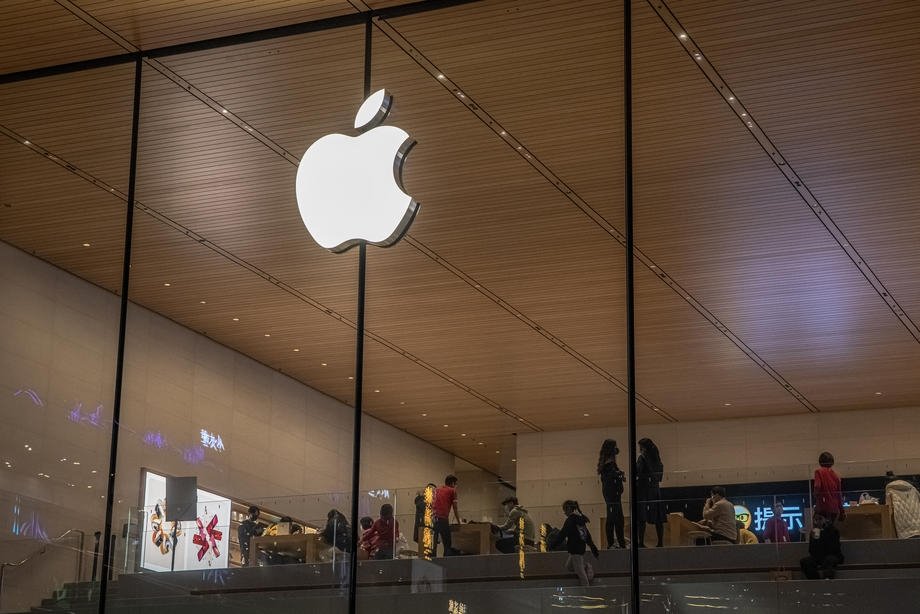Showbiz
EU Slams Apple with $1.95 Billion Antitrust Fine
Published
2 years agoon

The European Commission, the European Union’s executive arm, on Monday hit Apple with a 1.8 billion euro ($1.95 billion) antitrust fine for abusing its dominant position in the market for the distribution of music streaming apps.
The commission said it found that Apple had applied restrictions on app developers that prevented them from informing iOS users about alternative and cheaper music subscription services available outside of the app.
Read Also:
Apple also banned developers of music streaming apps from providing any instructions about how users could subscribe to these cheaper offers, the commission alleged.
This is Apple’s first antitrust fine from Brussels and is one of the biggest dished out to a technology company by the EU.
Apple shares were down around 2.5% in morning trading in the U.S. as the market reacted to the big stick.
The European Commission opened an investigation into Apple after a complaint from Spotify in 2019.
The probe was narrowed down to focus on contractual restrictions that Apple imposed on app developers which prevent them from informing iPhone and iPad users of alternative music subscription services at lower prices outside of the App Store.
Apple’s conduct lasted almost 10 years, according to the commission, and “may have led many iOS users to pay significantly higher prices for music streaming subscriptions because of the high commission fee imposed by Apple on developers and passed on to consumers in the form of higher subscription prices for the same service on the Apple App Store.”
Apple responds
In a fiery response to the fine, Apple said Spotify would stand to gain the most from the EU pronouncement.
“The primary advocate for this decision — and the biggest beneficiary — is Spotify, a company based in Stockholm, Sweden. Spotify has the largest music streaming app in the world, and has met with the European Commission more than 65 times during this investigation,” Apple said in a statement.
“Today, Spotify has a 56 percent share of Europe’s music streaming market — more than double their closest competitor’s — and pays Apple nothing for the services that have helped make them one of the most recognisable brands in the world.”
Apple said that a “large part” of Spotify’s success is thanks to the Cupertino, California-based giant’s App Store, “along with all the tools and technology that Spotify uses to build, update, and share their app with Apple users around the world.”
Apple said that Spotify pays it nothing. That’s because instead of selling subscriptions in its iOS app, Spotify sells them via its own website. Apple does not collect a commission on those purchases.
Developers over the years have spoken out against the 30% fee Apple charges on in-app purchases.
Spotify fires back
Spotify in a statement called the commission’s decision “an important moment in the fight for a more open internet for consumers.”
“Apple’s rules muzzled Spotify and other music streaming services from sharing with our users directly in our app about various benefits—denying us the ability to communicate with them about how to upgrade and the price of subscriptions, promotions, discounts, or numerous other perks,” Spotify said.
“Of course, Apple Music, a competitor to these apps, is not barred from the same behaviour.”
Share this:
- Click to share on X (Opens in new window) X
- Click to share on Facebook (Opens in new window) Facebook
- Click to share on WhatsApp (Opens in new window) WhatsApp
- Click to share on Pocket (Opens in new window) Pocket
- Click to share on Telegram (Opens in new window) Telegram
- Click to email a link to a friend (Opens in new window) Email
- Click to share on LinkedIn (Opens in new window) LinkedIn
You may like


EU Approves Arexvy, First Vaccine for Common Respiratory Virus


DEALS: Apple Appoints TD Africa First Indigenous Distributor for Nigeria


CBN’s printing of money harming Nigeria’s economy say World Bank, EIU


Record Breaker: Apple becomes 1st company to hit $3trn market value


UPDATED: Okonjo-Iweala appointed as WTO DG; gets EU support


Apple slashes in-App payment rules in revised App Store guidelines












